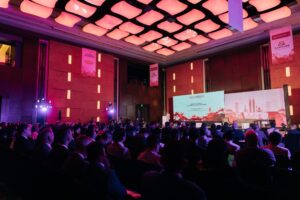SmartRecruitment.com’s Ellen Fröjd says it’s an employee market
Ellen Fröjd, CEO and recruitment consultant from SmartRecruitment.com. Thank you very much for being with us. It’s a very interesting time, especially coming off of the pandemic. We’ve seen so many changes in how people operate and how companies are hiring and some of the power has been put back into the hands of the employment seekers themselves. What are the current trends happening regarding iGaming recruitment?
Manila has always been the iGaming hub of Asia. And in our view, it’s continuing to be so as well. Obviously, there were movements where the pandemic hit where companies had to move out of Manila at the moment, having to close their operations. But for the past one to two years, they have started to come back to Manila, opening up their offices here again.
So, looking at the needs and the demands that we have from our clients, the Philippines is continuing to grow. In terms of trends, I would say the China market is one market that we hear much less about, from our view. I can of course only speak from a recruiter’s perspective in this.
But markets that we see are trending more and more, which they have been doing for some time, are markets like Thailand, Indonesia, Vietnam, Malaysia, and also India. And another market, which we are seeing a lot of actual local operators in Asia opening brands for, is Brazil. We also work with the Latin American market, so we do have operators and companies over there and in Europe, targeting Brazil. But we hear about and get inquires from companies, operating from Asia for the Brazilian market, because of the changes that are happening in that area at the moment.
Something that is still worth adding is that it’s really the candidates’ market, and it’s been the candidates’ market for some time. What I mean by that is there’s a higher demand than there is supply of industry professionals in this industry. So it’s very important for companies to have a strong employer brand, good recruitment process, and also overall a positive candidate experience if you’re looking to hire people in this industry.
What about the roles that people are that the companies are currently procuring? Have you seen that shift more in a certain direction, are they going more for entry-level, mid-level, higher level positions?
We help clients hire for all different departments, and we mostly focus on mid-level to C-level positions, because that’s also where our network has been growing throughout the past six years. With that said, looking at the positions that we see companies are hiring more and more for, the focus is really about market growth. Of course, there are also other positions that they are hiring for.
But, from the demand that we have from our clients, it’s really about market growth, and it goes for B2B and B2C companies. So any positions involving conversion and acquisition, business development and sales, product development, any kind of marketing strategic positions as well as developer roles. Obviously, some markets might focus more on some kind of positions and some markets on others, but overall, those are the positions that we see higher demand for.
Which are those markets?
As we all know, and as I mentioned, the Philippines is one of the iGaming hubs still in our view. So that’s one of the markets where they companies are hiring the above roles for. Another one is Taiwan, this is the market that has, in our perspective, been a very steady market even throughout the pandemic, specifically among the B2B companies. Taiwan didn’t have the same movement of companies closing down and having to move out that they had to do in Manila. They’re continuing to open up operations there as well.
Two other markets that see increasing demand, from our clients, are Thailand and Malaysia. Being very sensitive markets and gray areas, they’re not so official about the opening of these offices. We have both current clients as well as new clients coming to us wanting us to help them set up their teams in these countries, but it’s much more done under the radar.
Lastly, I would say Dubai. We have had clients for a long time working out of Dubai but we see more and more companies deciding to open up there. I would guess it’s a mix of tax reasons but also the convenient time zone, because it’s only about three to four hours difference to the majority of the Southeast Asian countries. So working from Dubai targeting Southeast Asia actually works time-wise very well.
Speaking of the time difference in the way that people are moving around, it has become more and more a digital nomad world, we’ve moved, especially during the pandemic, not only to working from home, but then people choosing to live in different countries from the ones they work in. How has that influenced then the retention of employees by companies?
With the whole digital nomad change that happened after the pandemic – the main thing that has really stuck is the remote flexibility. This is something that candidates are looking for and this is also something that has increased a lot among our clients, (in their) hiring needs as well. I know that not all positions, and all organizations, can have a remote setup. There might be some positions that need (employees) to be in an office.
But the majority of the roles can actually be done from a remote setup, basically. The upsides with a remote setup are, first of all, the productivity. There are studies showing that about 35 to 40 percent of the productivity actually increases when working remotely compared to working in an office. This also shows in the employees’ performance. So, in that sense, when people work remotely they are looking for work-life balance.
That’s something that a lot of candidates that we are talking to (are focused on), besides looking for a better salary and those the kinds of things. That (salary) used to be the highest focus. But today, working remotely, having a work-life balance, I will say is equal (or) sometimes even more requested from candidates. They can be okay with a little lower salary, if they’re able to work remotely and be able to control their own time in a different way.
Coming off of COVID, people are now not only focusing on money, they’re focusing on how they enjoy their lives. Do you think that’s something that’s going to be continued going forward?
I think so. This is more of a generalized view, from our standpoint. I think people are valuing (their flexibility) more. I think (regarding) the pandemic and the situation, specifically for some countries that were really strict on restrictions during the pandemic – and people went through personal things as well – it made them value their (personal) life and what they do with their life.
Of course, work is a big part of our life, about 70 percent of your life you’re working, and that’s why you need to do something that you love. We see that its a negotiation alternative, in terms of flexibility. So before, maybe four or five years ago, there was a very high focus on a higher salary (when changing jobs). That was it.
Now, of course, the salary is important. But if the employer would be open for them to work remotely from where they want, or six months a year if they want to work from Brazil because that’s where their family is, that can actually make them agree on a lower salary.
You mentioned right now that, in many fields, it’s a candidate’s market. Do you see it switching to a recruiter’s market within the next five years?
I’m not sure. I think it depends on how the market develops. I believe that the only way for that to happen is if companies are more open to hiring people from other industries. At the moment, we don’t have enough experts in the industry. For example, if you are an iGaming company today, interviewing a person that you find interesting for your organization, you can count on them having conversations with five other companies at the same time, and you want to convince the person to work for you. So that is really how it is today, at least from our view and the candidates that we speak to.
If you want the best people on the market, something that we try to make our clients more aware of is that this is an issue. We can only increase the iGaming experts in this industry by being more open to hiring people from other industries. This shouldn’t of course be from any industry but related ones – like crypto, Forex, FinTech, eCommerce. Also those working in business intelligence or digital marketing positions.
Coming from those industries can actually bring a good insight as well. So, if that happens, then for sure it can even out more to candidates’ and clients’ markets in the next five years. But it needs to be changed in terms of the mindset from the companies.













